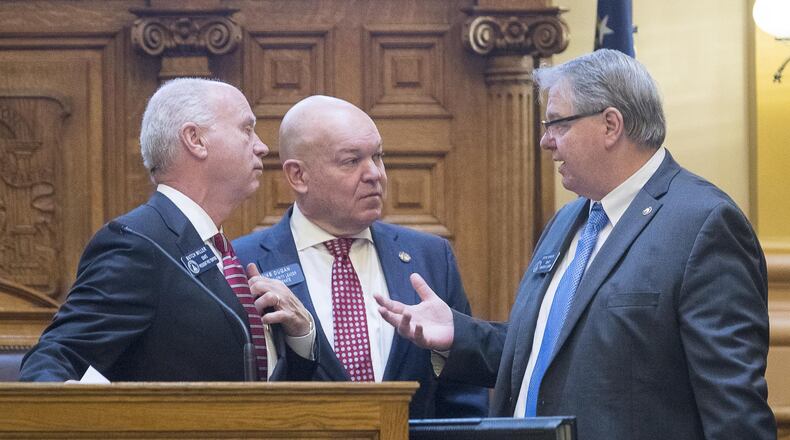Less than a year after a lobbyist filed a sexual harassment complaint against a Georgia state senator as the #MeToo movement gained steam, Senate Republicans responded by forcing through new rules that limited the window for someone to bring accusations against a member of the chamber.
The move angered women and Democrats in the chamber, and the new rules made national news. Two months later, Senate leaders now say they've reached an agreement to revise the controversial changes made to its sexual harassment policy in January.
The final version of the revision was being drafted Friday, and Majority Leader Mike Dugan said he expects a vote on the changes this week.
Rules approved by the majority-Republican chamber on the first day of the legislative session were met with an outcry and spurred Lt. Gov. Geoff Duncan to urge lawmakers to revisit them.
The plans for the new guidelines would require people who believe they’ve been harassed by a senator or Senate staffer to bring their allegations forward within four years of the alleged incident. Rules approved earlier this year had imposed a two-year time limit, when previously there had been no cutoff.
On the first day of the session, when the Senate's 21 Democrats and Buford Republican state Sen. Renee Unterman voted against the policy change, they said the rules would discourage those who've been harassed from coming forward.
The expected new four-year time limit applies to all complaints about the conduct of senators, not just sexual harassment cases.
The Republican Senate leadership blocked the policy from being amended on the first day of the session. So it will require two-thirds consensus in the Senate to make any changes to the rules.
The proposed new changes are also expected to get rid of January-approved rules that would have sanctioned anyone who filed a complaint and made it public as well as a guideline that barred cases from being investigated while a senator was running for re-election or other office.
Senate Minority Leader Steve Henson, D-Stone Mountain, said while he has yet to see the finalized version of the changes, he's hopeful the Democratic caucus will be happy with the revisions.
“I hope early next week we’ll have a vote and we’ll adopt changes to the Senate rules which will not satisfy all the complaints, but should help in some ways to alleviate some of our concerns,” Henson said.
Late in the last session, a veteran lobbyist filed a complaint against then-state Sen. David Shafer, who was considered the front-runner in the GOP race for lieutenant governor.
The lobbyist said Shafer retaliated against her and harassed her after helping her get a bill passed in 2011, and the case was the talk of the final few days of the 2018 session. Even under the potential revised rules, her case would not be investigated because the alleged harassment happened more than four years before she reported it.
A panel of Senate leaders meeting in secret last year ended up dismissing the complaint, but the case hurt Shafer's candidacy. He narrowly lost the Republican primary runoff to Duncan in July.
As this session's 40 legislative days have rolled by, state Sen. Jen Jordan said she worries the changes will never make it to the floor for a vote. Jordan, an attorney and Atlanta Democrat, helped broker the deal for the revised rules.
“I’m hopeful and cautiously optimistic,” she said. “But as every day ticks by, it raises my antenna a little bit.”
Dugan said they’ve been working to make sure they get the policy right.
“It’s important to us, but these rules impact 56 people and it’s taken a little bit of time because we’ve been passing legislation that affects 10.5 million,” he said.
Stay on top of what's happening in Georgia government and politics at ajc.com/news/georgia-government/.
About the Author
Keep Reading
The Latest
Featured




